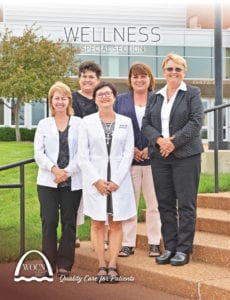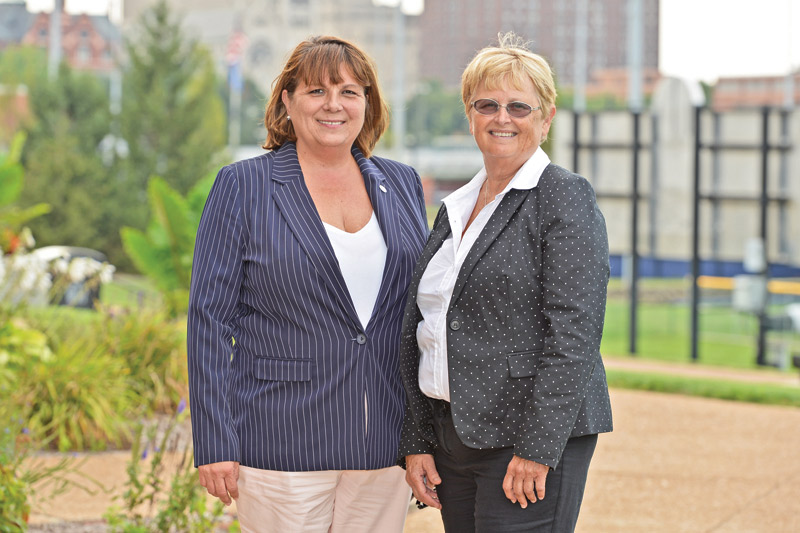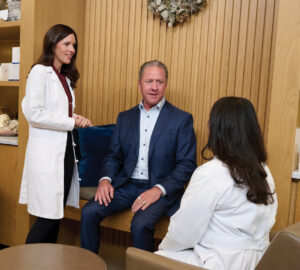If you were ill or injured with a wound that wouldn’t heal, would you know where to turn for advice, treatment and relief? Chronic wounds may not be the most talked-about health care topic, but they are a common occurrence according to St. Louis WOCN, the local affiliate of the Wound, Ostomy and Continence Nurses Society. These wounds seriously impact quality of life, and their ongoing care may not be covered by insurance.
Founded 50 years ago, the local chapter has specially trained nurses who volunteer their time with patients in any setting, including homes, hospitals, rehab clinics and nursing centers, says Katie James, BA, RN, CWCN, president of the St. Louis affiliate. They care for people with bedsores, wounds due to injuries, skin ulcers, ostomies and other conditions, as well as those dealing with urinary or fecal incontinence. (An ostomy is an opening in the abdomen that allows waste to drain from the bladder or intestines.)
 Besides providing compassionate bedside care, the nurses also offer education for patients, families and health providers, helping to speed the healing process and prevent complications. “Almost any person with a chronic illness can have chronic wounds,” says local president-elect Retta Sutterfield, RN, MSN, ACN-BS, CWOCN. “We assist patients in a variety of ways and serve as their advocates. We help improve their nutrition, keep the skin clean and dry, make sure they move regularly, monitor their mental health, and use preventive measures to avoid problems. We work closely with everyone from medical professionals to staff who maintain the beds.”
Besides providing compassionate bedside care, the nurses also offer education for patients, families and health providers, helping to speed the healing process and prevent complications. “Almost any person with a chronic illness can have chronic wounds,” says local president-elect Retta Sutterfield, RN, MSN, ACN-BS, CWOCN. “We assist patients in a variety of ways and serve as their advocates. We help improve their nutrition, keep the skin clean and dry, make sure they move regularly, monitor their mental health, and use preventive measures to avoid problems. We work closely with everyone from medical professionals to staff who maintain the beds.”
Patients often are in wheelchairs and may be dealing with conditions like heart failure, rheumatoid arthritis and lupus, she notes. Urinary incontinence and diabetic foot ulcers are common as well. People with ostomies and wounds often need help learning to care for themselves, and they can ask to be referred to WOCN for assistance. Sutterfield says the St. Louis chapter’s largest event of the year is Woundstock, a oneday conference with accredited education for nurses in the field, and it hosts another educational conference called Ostomy Continence Together. The organization also provides scholarships for nurses seeking WOCN certification.
Becoming certified requires a bachelor’s degree, RN certification, rigorous didactic and clinical experience, testing and five-year recertification. The requirements are strict because the nurses provide such important, highly specialized care, James says. “There is no physician specialty dealing with wound care, so we are the experts and educators on the subject,” she notes. “Every month, we meet to discuss best practices, challenging cases and how to best serve our patients.” The organization works closely with others like the United Ostomy Associations of America and the National Pressure Ulcer Advisory Panel to stay current on care practices and education.
About 90 WOCN nurses work in the St. Louis region, and they improve quality of life for wound, ostomy and continence patients every day. “There are 6.7 million people in the U.S. with nonhealing wounds and 450,000 with ostomies,” James says. “Studies show that when patients work with a certified wound nurse, pressure injuries like bedsores occur about half as often. That’s how big of a difference we can make.”
St. Louis WOCN is a network of highly trained nurses who provide specialized care for patients with wounds, ostomies and incontinence issues. Pictured on the cover: Janet Brammeier, Cathy Wittenauer, Roxy Lupien, Katie James and Retta Sutterfield. Individuals can reach the organization through local hospitals, wound care centers and the website sltwocn.org.
Cover design by Cydney Moore
Cover photo by Bill Barrett
Pictured above: St. Louis WOCN president Katie James and president-elect Retta Sutterfield.








